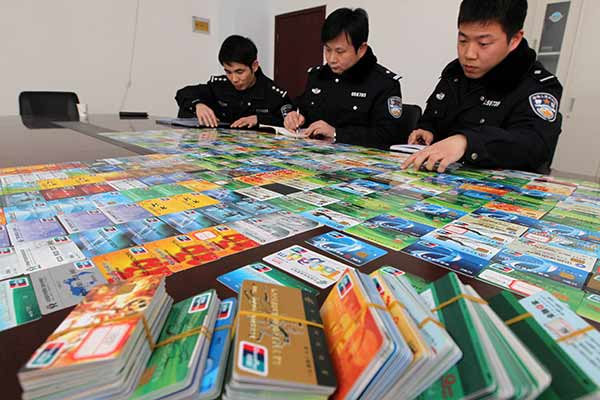 |
|
Police officers make a list of bank cards seized in a telecommunication fraud case in Xuchang, Henan province, in January. NIU YUAN/CHINA DAILY |
Xu Yuyu, a college-bound student in Linyi, Shandong province, died recently after suffering a sudden cardiac arrest apparently brought on by the stress of being swindled out of the nearly 10,000 yuan ($1,500) that her family had raised for her tuition fees in a telephone fraud.
This is only one of the many tragedies that are caused by the rampant telecom scams in China. There have been an increasing number of such swindles in the Chinese mainland in recent years, including some large-scale criminal activities committed by residents in Taiwan.
The fraudsters have benefited from China's well-developed telecom sector and booming online commercial and financial activities. Given that transferring funds via the internet is very convenient, many Chinese people have got accustomed to online financial activities in their daily lives. However, the difficulties financial institutions face in verifying traders' identities as well as the need to use transaction codes or passwords for deals offer opportunities for swindlers.
The Chinese government has demanded financial institutions strictly monitor their online financial activities and ensure the security of the necessary data and information for such transactions. At the same time, real-name registration for phone users is being implemented to prevent people using false identities. However, the real-name registration system has not been effectively implemented by all telecommunication operators. To popularize their virtual network telephone business, some operators usually allow private telephone network operators to promote telephone cards that separate some special telephone numbers that hide the identity of the user.
Although some scholars have expressed concerns over the real-name registration system for phone users, believing it may undermine freedom of communication. Such concerns ignore the people's right to communicate safely. If users' legitimate rights and interests are harmed by their phone use, there is no freedom of communication. The death of the young student in Linyi tellingly demonstrates that only safe communication can ensure real freedom of communication.
The country's law on the protection of the rights and interests of consumers stipulates that providers of goods and services via the internet, television, telephone or postal service, as well as the operators of securities, insurance and other financial services should provide customers with genuine contact information. This is an unshirkable responsibility.
Nor should users be permitted to employ technological means to hide their authentic identities. The telecom service providers should also use the available technology to prevent fraudsters from changing their phone numbers and ensure any transactions are conducted with the authentic personal information provided. Any telecom fraud resulting from telecom operators not implementing the real-name registration of users should be legally held accountable.
For financial institutions, they should implement security measures for online transactions and remind consumers to verify the information provided by the other party when doing financial activities via the internet. Precautions should also be taken to prevent people's telephone numbers or other personal information from being utilized by criminal suspects. Any failure to take such precautions should mean the institution bears a joint liability for any financial losses a customer suffers.
The author is a professor of law at Zhongnan University of Economics and Law.